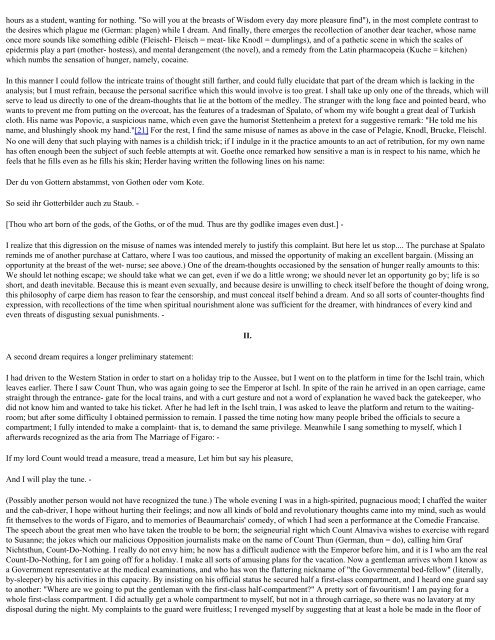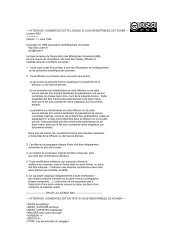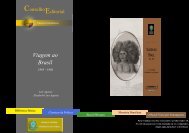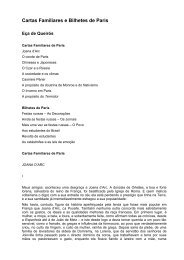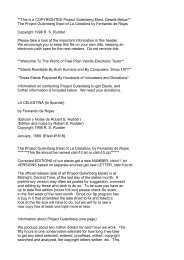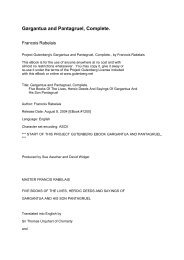The Interpretation of Dreams Sigmund Freud (1900)
The Interpretation of Dreams Sigmund Freud (1900)
The Interpretation of Dreams Sigmund Freud (1900)
Create successful ePaper yourself
Turn your PDF publications into a flip-book with our unique Google optimized e-Paper software.
hours as a student, wanting for nothing. "So will you at the breasts <strong>of</strong> Wisdom every day more pleasure find"), in the most complete contrast to<br />
the desires which plague me (German: plagen) while I dream. And finally, there emerges the recollection <strong>of</strong> another dear teacher, whose name<br />
once more sounds like something edible (Fleischl- Fleisch = meat- like Knodl = dumplings), and <strong>of</strong> a pathetic scene in which the scales <strong>of</strong><br />
epidermis play a part (mother- hostess), and mental derangement (the novel), and a remedy from the Latin pharmacopeia (Kuche = kitchen)<br />
which numbs the sensation <strong>of</strong> hunger, namely, cocaine.<br />
In this manner I could follow the intricate trains <strong>of</strong> thought still farther, and could fully elucidate that part <strong>of</strong> the dream which is lacking in the<br />
analysis; but I must refrain, because the personal sacrifice which this would involve is too great. I shall take up only one <strong>of</strong> the threads, which will<br />
serve to lead us directly to one <strong>of</strong> the dream-thoughts that lie at the bottom <strong>of</strong> the medley. <strong>The</strong> stranger with the long face and pointed beard, who<br />
wants to prevent me from putting on the overcoat, has the features <strong>of</strong> a tradesman <strong>of</strong> Spalato, <strong>of</strong> whom my wife bought a great deal <strong>of</strong> Turkish<br />
cloth. His name was Popovic, a suspicious name, which even gave the humorist Stettenheim a pretext for a suggestive remark: "He told me his<br />
name, and blushingly shook my hand."[21] For the rest, I find the same misuse <strong>of</strong> names as above in the case <strong>of</strong> Pelagie, Knodl, Brucke, Fleischl.<br />
No one will deny that such playing with names is a childish trick; if I indulge in it the practice amounts to an act <strong>of</strong> retribution, for my own name<br />
has <strong>of</strong>ten enough been the subject <strong>of</strong> such feeble attempts at wit. Goethe once remarked how sensitive a man is in respect to his name, which he<br />
feels that he fills even as he fills his skin; Herder having written the following lines on his name:<br />
Der du von Gottern abstammst, von Gothen oder vom Kote.<br />
So seid ihr Gotterbilder auch zu Staub. -<br />
[Thou who art born <strong>of</strong> the gods, <strong>of</strong> the Goths, or <strong>of</strong> the mud. Thus are thy godlike images even dust.] -<br />
I realize that this digression on the misuse <strong>of</strong> names was intended merely to justify this complaint. But here let us stop.... <strong>The</strong> purchase at Spalato<br />
reminds me <strong>of</strong> another purchase at Cattaro, where I was too cautious, and missed the opportunity <strong>of</strong> making an excellent bargain. (Missing an<br />
opportunity at the breast <strong>of</strong> the wet- nurse; see above.) One <strong>of</strong> the dream-thoughts occasioned by the sensation <strong>of</strong> hunger really amounts to this:<br />
We should let nothing escape; we should take what we can get, even if we do a little wrong; we should never let an opportunity go by; life is so<br />
short, and death inevitable. Because this is meant even sexually, and because desire is unwilling to check itself before the thought <strong>of</strong> doing wrong,<br />
this philosophy <strong>of</strong> carpe diem has reason to fear the censorship, and must conceal itself behind a dream. And so all sorts <strong>of</strong> counter-thoughts find<br />
expression, with recollections <strong>of</strong> the time when spiritual nourishment alone was sufficient for the dreamer, with hindrances <strong>of</strong> every kind and<br />
even threats <strong>of</strong> disgusting sexual punishments. -<br />
A second dream requires a longer preliminary statement:<br />
II.<br />
I had driven to the Western Station in order to start on a holiday trip to the Aussee, but I went on to the platform in time for the Ischl train, which<br />
leaves earlier. <strong>The</strong>re I saw Count Thun, who was again going to see the Emperor at Ischl. In spite <strong>of</strong> the rain he arrived in an open carriage, came<br />
straight through the entrance- gate for the local trains, and with a curt gesture and not a word <strong>of</strong> explanation he waved back the gatekeeper, who<br />
did not know him and wanted to take his ticket. After he had left in the Ischl train, I was asked to leave the platform and return to the waiting-<br />
room; but after some difficulty I obtained permission to remain. I passed the time noting how many people bribed the <strong>of</strong>ficials to secure a<br />
compartment; I fully intended to make a complaint- that is, to demand the same privilege. Meanwhile I sang something to myself, which I<br />
afterwards recognized as the aria from <strong>The</strong> Marriage <strong>of</strong> Figaro: -<br />
If my lord Count would tread a measure, tread a measure, Let him but say his pleasure,<br />
And I will play the tune. -<br />
(Possibly another person would not have recognized the tune.) <strong>The</strong> whole evening I was in a high-spirited, pugnacious mood; I chaffed the waiter<br />
and the cab-driver, I hope without hurting their feelings; and now all kinds <strong>of</strong> bold and revolutionary thoughts came into my mind, such as would<br />
fit themselves to the words <strong>of</strong> Figaro, and to memories <strong>of</strong> Beaumarchais' comedy, <strong>of</strong> which I had seen a performance at the Comedie Francaise.<br />
<strong>The</strong> speech about the great men who have taken the trouble to be born; the seigneurial right which Count Almaviva wishes to exercise with regard<br />
to Susanne; the jokes which our malicious Opposition journalists make on the name <strong>of</strong> Count Thun (German, thun = do), calling him Graf<br />
Nichtsthun, Count-Do-Nothing. I really do not envy him; he now has a difficult audience with the Emperor before him, and it is I who am the real<br />
Count-Do-Nothing, for I am going <strong>of</strong>f for a holiday. I make all sorts <strong>of</strong> amusing plans for the vacation. Now a gentleman arrives whom I know as<br />
a Government representative at the medical examinations, and who has won the flattering nickname <strong>of</strong> "the Governmental bed-fellow" (literally,<br />
by-sleeper) by his activities in this capacity. By insisting on his <strong>of</strong>ficial status he secured half a first-class compartment, and I heard one guard say<br />
to another: "Where are we going to put the gentleman with the first-class half-compartment?" A pretty sort <strong>of</strong> favouritism! I am paying for a<br />
whole first-class compartment. I did actually get a whole compartment to myself, but not in a through carriage, so there was no lavatory at my<br />
disposal during the night. My complaints to the guard were fruitless; I revenged myself by suggesting that at least a hole be made in the floor <strong>of</strong>


